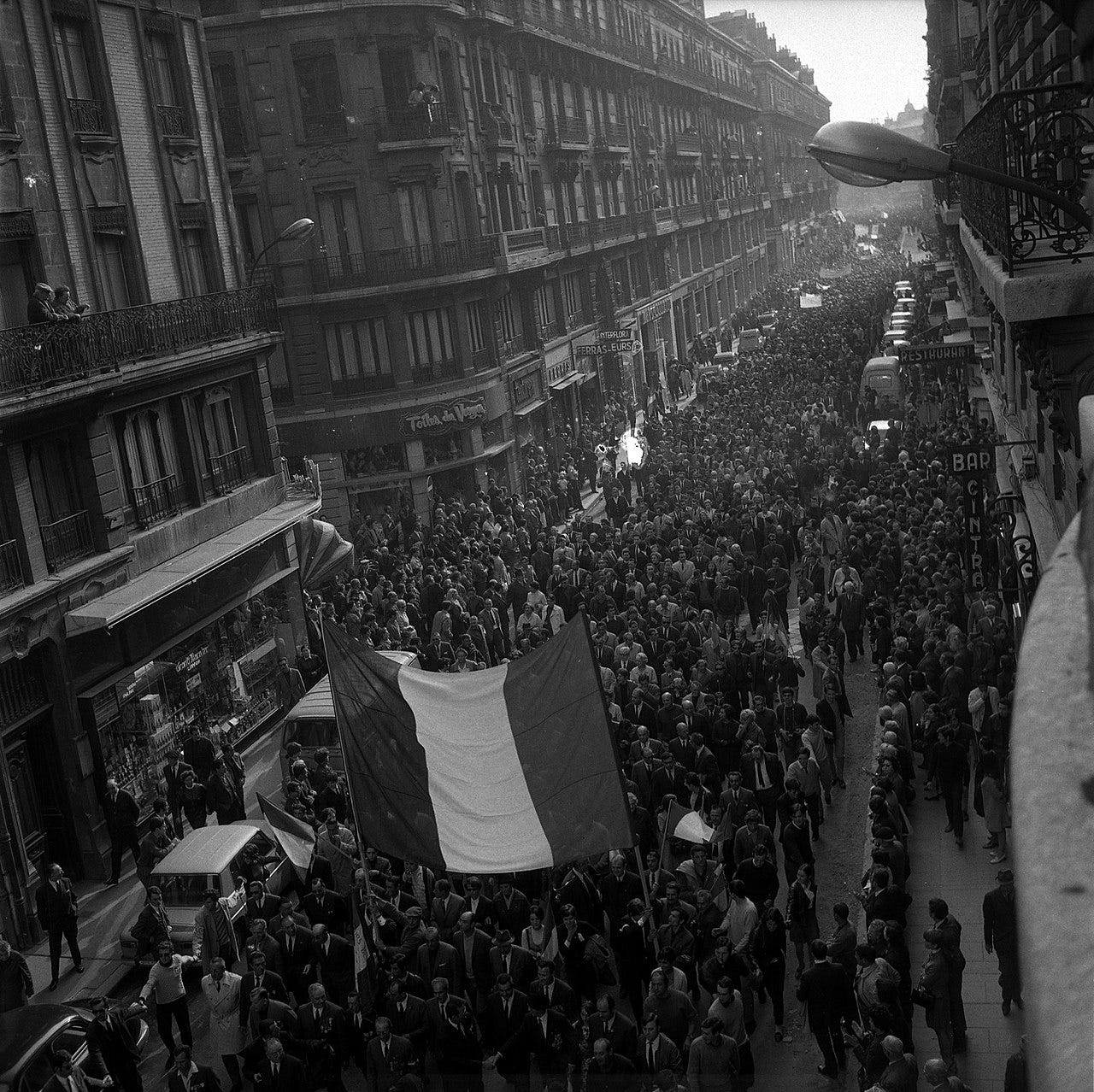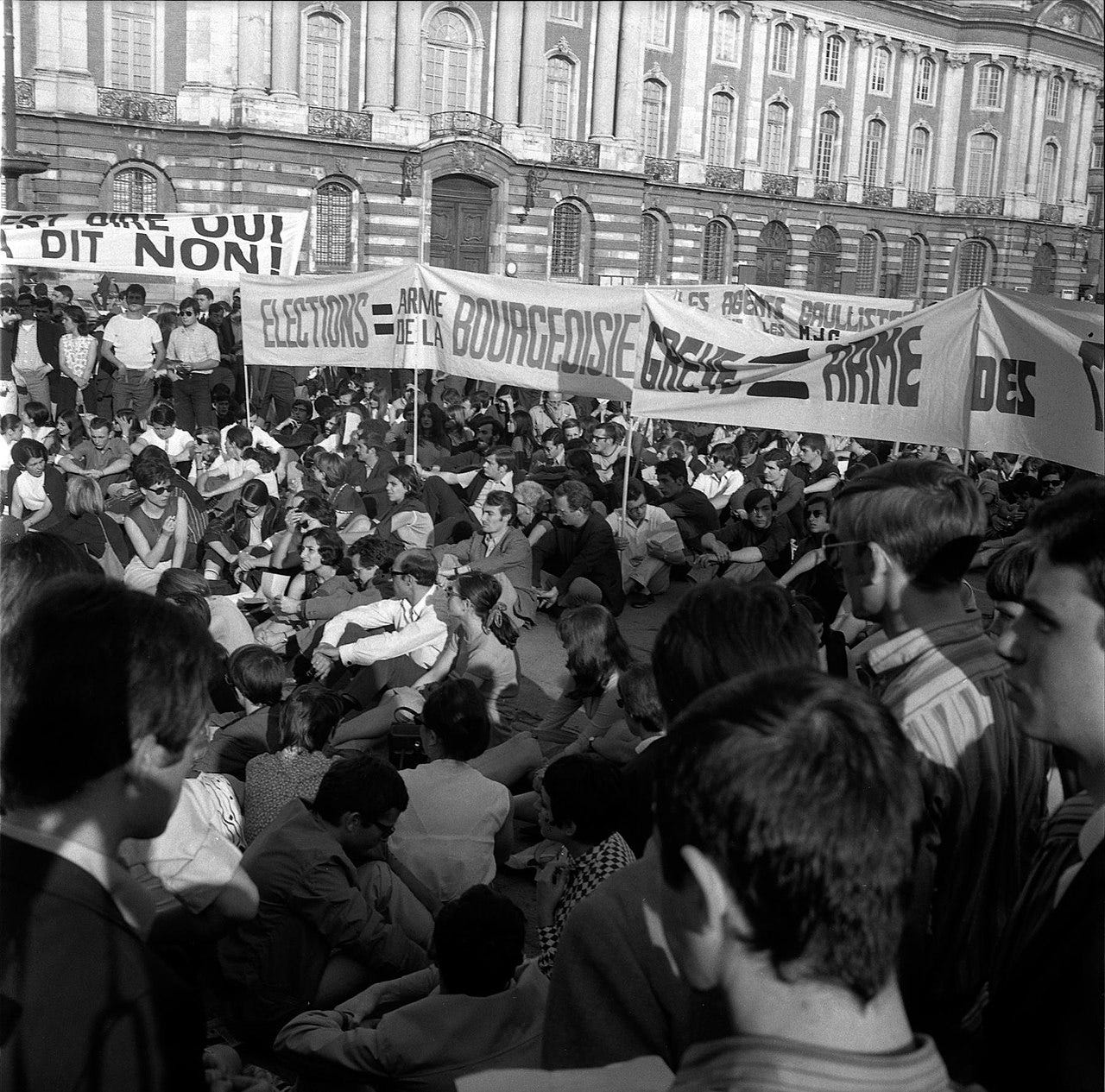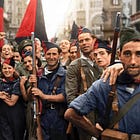Beneath the pavement, disappointment
How the 1968 French uprising sparked a radical blaze and opened the doors of possibility—then slammed them shut.
At least for one luminous, hallucinogenic instant in May of 1968, France was on the verge of burning capitalism to the ground. Students and workers filled the streets. The usual friction—between bourgeois kids in protest chic and hardened, unionized laborers—melted into a hard-core stew of rebellion. From the Latin Quarter to the factories of Renault, a seismic jolt of solidarity rippled across the country. The scale was unprecedented: eleven million students and workers rose up against the status quo (that's 22% of the entire population—absolutely insane).
It was a moment of raw fury, a crossroads that could have birthed a radical new world in the West. And then, in a blink, it was over. Capitalism spat out the bones, clinked champagne glasses, and continued its unstoppable march. Just like it always does. Just like it always fucking does.
What the hell happened?
“Sous les pavés, la plage!”
It all started with an avant-garde swirl of demands from students at the University of Nanterre, just outside Paris. They were pissed off by what they perceived as archaic teaching structures and social repression—gloomy professors, bullshit hierarchies, paternalistic administration. These kids, though privileged by birth, discovered that reading Marx, Kropotkin, and Debord can do weird things to the mind. They realized they lived in a cage, even if it was a golden one. So they decided to do shit.
Within days, the campus was locked down. The battles spilled over to the Sorbonne in central Paris. Students tore up cobblestones, hurled them at the riot police, and awakened that feral spirit of French insurrection.
“Sous les pavés, la plage!” roared from graffiti-splattered walls. Beneath the pavement, the beach. A beach of possibility, transformable, a new world. Name giver of this Substack publication.
Beneath the rigid, soulless order, there might be something else, they thought—something like freedom.
Students alone can’t do shit
Well, it’s one thing for a group of half-broke philosophy students to barricade streets. It’s another when the factories shut down. And that’s exactly what happened in mid-May. The proletariat, weighed down by stagnant wages and oppressive working conditions, decided enough was enough. Unions rallied. Overnight, the entire economy ground to a halt. Industry. Transport. Public services. Even the fricking garbage collection.
This was the raw power Karl Marx wrote about: when those who actually produce for society stop the wheels from turning, society halts. For once, the romantic fantasies of unity became reality. Arm in arm, students and workers forced the system’s hand. A beautiful, improbable coalition—brief though it was.
But let’s not romanticize it too much. There was tension. Class distinctions remained. The gulf between theory-addled students who might one day rejoin the bourgeois and hardened workers who’d been exploited for decades didn’t just evaporate overnight. Yet in that crucial moment, they were united in revolt. And when you get that many people out in the streets, the government starts to sweat.
Revolution! …cancelled
This French insurrection was the pièce de résistance of a broader global wave of uprisings in 1968. Students occupied campuses in the United States to protest the Vietnam War. German activists staged massive demonstrations (Westdeutsche Studentenbewegung). In Mexico, the Tlatelolco massacre showed the lethal edge of state power. Czechoslovakia’s Prague Spring attempted to carve out a democratic socialism only to be crushed by Soviet tanks. Every corner of the world seemed to roil with revolt. Hope flickered, illusions soared… and then, system by system, it all got shut down or beaten into submission.
France, ironically the birthplace of the modern revolution mythos, became the stage for the biggest near-miss of them all. In late May, President Charles de Gaulle briefly fled the country—he actually fled!—seeking assurance from the French army in Germany that he still had the loyalty of the troops. He came back, dissolved the National Assembly, called elections, and somehow maintained power. Georges Pompidou, his prime minister and eventual successor, negotiated directly with the unions, offering wage increases and improved working conditions. That pacified enough of the labor force to coax them back into the factories. Voilà. Movement defanged. The wheels started turning again.
Many of the students, exhausted, disillusioned, or co-opted into political parties, drifted off to do what every rebellious generation eventually does: settle. Years passed, they got jobs, had children, paid mortgages, became “respectable.” The baton of resistance was never fully passed on. The generation that almost changed the world went on to sell it to the highest bidder.
Then came neoliberalism
Yet it wasn’t all entirely for nothing. University reforms were enacted, though modestly. Workplace conditions improved somewhat. The old patriarchal structures of French society got a shake-up. A vibrant counterculture blossomed, fueling art, film, philosophy, you name it.
But if you measure success by, oh, I don’t know, actual systemic change or class emancipation, then, yeah: it failed completely. The state survived without significant reform. Capitalism survived. Shit, it thrived. By the 1970s, the neoliberal tide was creeping in, and by the ’80s, Reagan and Thatcher were partying on the grave of any real socialist alternative.
Were the protestors naive idiots? Probably. Not entirely. The truth is that, for a moment, capitalism’s unstoppable train actually wobbled. The French economy was paralyzed to a degree unthinkable today. And that glimpse of possibility—that ephemeral sense that things do not have to be this way—might be the essential gift and curse of May ’68.
Failure (& lessons)
May 1968 has become fetishized, repackaged as cheap iconography—a Che Guevara T-shirt phenomenon (yeah, I have one). Every year, you get the glossy magazine retrospectives: “Anniversary of May ’68,” trotted out with nostalgic photos of kids ripping up cobblestones. Meanwhile, the current “Left,” such as it is, is practically non-existent. We share memes on social media. We talk about solidarity, but we rarely cross lines from our digital filter bubbles into real-world disruption. I discussed this recently:
The biggest takeaway from ’68 might be how fleeting real unity is. For a heartbeat, there was synergy between students and workers. Then it fractured under the very real weight of material needs and manipulation. Humans are selfish creatures. Satisfy the material needs of crucial protest groups and the revolution dies.
Also, if you don’t push for radical new structures—real alternatives—someone else will eventually come along and cut a deal, temper the revolution, lock you back into normalcy. Alternatives have to be tangible and materially attractive. The Right invests in institutions, media, and power-building. The Left invests in reading groups and moral superiority. The Right, unfortunately, keeps winning.
What is there beneath the pavement? That slogan might be the best summary of both the delirious hope and the cruel letdown. Yes, beneath the oppressive architecture of modern life is a wide-open beach of possibility. But guess what? A beach is easy to conquer. Capital just plops a luxury resort on it and moves on.
May ’68 was a door cracked open just wide enough for us to see through. Behind that door, entire worlds of possibility shimmered. Then, so very fucking fast, the door slammed shut in our faces. The real tragedy is that once you’ve glimpsed that other side—where workers and students unite, where everyday life halts the whole capitalist juggernaut if it wants to—you can never quite forget it. It haunts you. Reminds you how close we came to being something more than wage slaves in a consumer carnival.
It was the moment the Western world stood at a crossroads, and we took the wrong turn. Such a moment might never come again.
But ghosts linger. Eventually, they become T-shirt slogans and museum exhibits, while the rest of us keep working our bullshit jobs, flirting with AI doomsday fantasies, and waiting for the next spark that might (but probably won’t) burn the entire rotting edifice to cinders. Because that’s the cycle, isn’t it? Revolt, fail, get co-opted, wait for the next rebellion.
Some interesting words scrawled on Paris walls in 1968:
“We don’t want a world where the guarantee of not dying of starvation brings the risk of dying of boredom.”
Well, they gave it a good shot. They glimpsed the beach under the pavement. Then, in classic fashion, capitalism set up a damn souvenir stand on that beach and started selling useless shit.
Beneath the pavement, yeah.
Antonio
Some sources
Images are all from Wikipedia.
Beneath the Pavement, the Beach: Paris in 1968 | Department of History (utk.edu)
Bourg, Julian. From Revolution to Ethics May 1968 and Contemporary French Thought Montreal: McGill-Queen’s University Press, 2007, 25.
Ross, Kristin. May ’68 and Its Afterlives. Chicago: University of Chicago Press, 2002, 3.
Mark Kurlansky, 1968: The Year That Rocked the World (Ballantine Books, 2004).
Donald Reid, “Politics, Police, and Pickets: France’s Largest Strike, May–June 1968,” in 1968: The World Transformed, eds. Carole Fink, Philipp Gassert, and Detlef Junker (Cambridge University Press, 1998).
Frédéric Joignot, “La ‘chienlit’, une histoire d’un mot de Rabelais à Sarkozy” Le Monde (10 October 2015). https://www.lemonde.fr/politique/article/2015/10/15/chienlit-ce-mot-mis-a-l-index_4790489_823448.html












Really good writing and a timely history lesson. The working class is confused and divided right now but getting wiser by the day, I think and hope. First step is realizing and teaching of the power we hold. Onward
Really good.